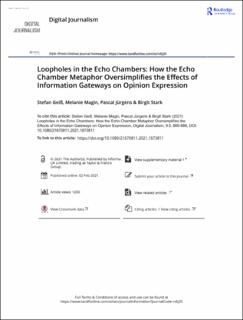| dc.contributor.author | Geiss, Stefan | |
| dc.contributor.author | Magin, Melanie | |
| dc.contributor.author | Jürgens, Pascal | |
| dc.contributor.author | Stark, Birgit | |
| dc.date.accessioned | 2022-02-28T16:14:12Z | |
| dc.date.available | 2022-02-28T16:14:12Z | |
| dc.date.created | 2021-11-26T10:11:23Z | |
| dc.date.issued | 2021 | |
| dc.identifier.citation | Digital Journalism. 2021, 9 (5), 660-686. | en_US |
| dc.identifier.issn | 2167-0811 | |
| dc.identifier.uri | https://hdl.handle.net/11250/2981882 | |
| dc.description.abstract | Social media (SM) are often regarded drivers of personalized echo chambers in which only ideas resonante that individuals already hold, leading to more extreme opinions and intensified opinion expression. However, recent theorizing and evidence has cast doubts on the universal applicability of the echo chamber metaphor, pointing out that communication effects on opinion expression are much more complex than the metaphor suggests. Using the refugee crisis in Germany as a background, the current study challenges four implicit premises of the echo chamber metaphor empirically. The findings show a more complex picture than the metaphor implies: (1) Ignoring other information sources beyond SM may lead to severe misinterpretations; seeming evidence for echo chambers disappears after controlling for news media use. (2) SM reliance does not generally stimulate opinion expression. (3) Attitude extremity moderates the effect of SM reliance, suggesting that people with more extreme views are susceptible to echo chamber effects. (4) Attitude position on the issue-at-hand moderates the effect of SM reliance, which suggests that echo chambers do not completely shield their users from the public discourse. We propose the Echo Chamber Continuum (ECCo) Model to stimulate developing the echo chamber metaphor into a theory suitable for studying opinion formation. | en_US |
| dc.language.iso | eng | en_US |
| dc.publisher | Taylor & Francis | en_US |
| dc.rights | Attribution-NonCommercial-NoDerivatives 4.0 Internasjonal | * |
| dc.rights.uri | http://creativecommons.org/licenses/by-nc-nd/4.0/deed.no | * |
| dc.title | Loopholes in the Echo Chambers: How the Echo Chamber Metaphor Oversimplifies the Effects of Information Gateways on Opinion Expression | en_US |
| dc.type | Peer reviewed | en_US |
| dc.type | Journal article | en_US |
| dc.description.version | publishedVersion | en_US |
| dc.source.pagenumber | 660-686 | en_US |
| dc.source.volume | 9 | en_US |
| dc.source.journal | Digital Journalism | en_US |
| dc.source.issue | 5 | en_US |
| dc.identifier.doi | 10.1080/21670811.2021.1873811 | |
| dc.identifier.cristin | 1959564 | |
| cristin.ispublished | true | |
| cristin.fulltext | original | |
| cristin.qualitycode | 2 | |

